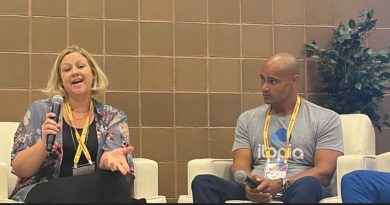Why Emotional Intelligence Matters for Educators
Janet Patti, professor emerita at Hunter College, and Robin Stern, psychologist, joined forces decades ago when they recognized the crucial role of emotional intelligence for school leaders. How educators understand and manage emotions can positively impact the entire school community, contribute to better leadership, well-being, and resilience. The problem is, for many education leaders, developing emotional intelligence is low on the to-do list.
“People can burn out. People can be exhausted. And we hear that from leaders. It really takes a bite out of well-being when you’re constantly in the state of emotion labor and you’re not attending to that,” Stern says.
High rates of stress and turnover in school leader positions only point to more need for emotional intelligence training in leadership development. In their book, Emotional Intelligence for School Leaders, they push for social-emotional learning as a required skill for school leaders. They also share how educators can develop a practice of incorporating emotions, and how coaching and professional development can only help sustain educators in the field.
“Many people just see it as, ’I’m not going to spend my money on me.’ That’s number one. ‘I’m not going to spend my money on adults. I’m going to spend it where we need it on kids.’ We understand that,” Patti says. “But if they only realize that by the investment in the principals and the assistant principals and even the superintendent who also is not faring well in terms of long lasting, they would have such a different outcome. Such a more productive environment. Kids would be able to achieve. Adults who would be happy going to work. It would be a different world.”
In this episode, we discuss the need for training in emotional intelligence, sharing real-life examples of leaders who have successfully integrated these skills into their roles, and how it can change a school culture.
Transcript
JILL ANDERSON: I’m Jill Anderson. This is the Harvard EdCast.
Janet Patti and Robin Stern believe emotional intelligence is a critical skill school leaders need to thrive in their work. For decades, they have coached educational leaders on how to integrate emotional intelligence into leadership practices. Research shows a leader’s ability to regulate their own emotions can have positive effects on the entire school.
Burnout and turnover are an enormous challenge facing school leaders. About 11% of principals left the profession between 2020 and 2022. They say emotional intelligence can help retain leaders, but it still isn’t emphasized as part of training and professional development. I want to know more about how leading with self-awareness and empathy can promote well-being and resilience. First, I asked Robin what emotional intelligence is.

ROBIN STERN: Emotional intelligence is being smart about your feelings in the service of your goals. So using your thinking to inform your feelings, using your feelings to inform your thinking, and all the while keeping in mind where you’re going with it. So emotions are information, and they’re data we collect just by listening to what’s going on inside of us and outside of us. And when you can make sense of that and when you intentionally want to make sense of that, when you can name your emotions so that you can ultimately tame them or work with them, then you’re in control as opposed to your emotions being in control of you.
JILL ANDERSON: So what is it about emotional intelligence that’s so valuable for school leaders in particular?
ROBIN STERN: Emotions are valuable for school leaders because they need to be aware of the impact they’re having on people when they walk through the door in the morning. Emotions are contagious. They’re talking to people. They’re maybe sitting with something that happened before they even walked through the door, like a fight with their daughter or their husband, or their uncomfortable call on the way to school from an angry parent. And yet, they have to do their job.
So how do they manage their emotions? Being able to be aware that you’re having emotions that you need to manage in the first place. Being aware that you are a role model for all the teachers in the school, and ultimately for the students as well. That the way you understand and manage yourself gets communicated through the community every day, all day. As I said, walking through the hallway, going into your office, greeting people. And it’s in the small moments, not just the big moments, that emotional intelligence show up.
JANET PATTI: Yeah. I think what’s important for us to remember is that all day long, educational leaders are making decisions. They are dealing with emotions every second. It’s so different than dealing with being a corporate CEO. It’s the kind of job where you’re on the spot 24/7, and you need to respond right away.
Well, if they’re not aware of their own emotions and they’re not working on their own emotions, how are they going to be able to deal with the emotions of others, and how are they going to make the decisions that are really more appropriate the kind of decisions that come from a deep place of self-awareness and being present and attuned to the people around them?
ROBIN STERN: I would add to that as well, I remember having conversations years ago with a colleague of ours, Ted Repa from NYU, who was at the time the head of the leadership organization– the leadership at NYU. And we always asked ourselves, well, what are the emotions that leaders invite themselves to have by just walking into that position? Because you’re dealing with so much more, so you may be experiencing maybe not even different emotions, but more intense m and more of the time.
So you might be able to as a teacher set aside that classroom time where you are focusing on what’s going on with your agenda, with your students in front of you. And there can be things that happen, but with a leader in that same moment, you can be getting a call from an angry parent. You can be getting a call from your district office. You can be dealing with something that you see going on in the hallway. There’s no time where leaders are not dealing with some emotion.
JILL ANDERSON: You know, you’ve written a little bit about this idea of almost a resistance, or leaders existing in reactionary states. And sometimes you’re just going through the motions. You go to work and you’re just like, I want to get through the day. Is it hard for leaders in particular to tap into and develop some sort of recognition of this emotional state they’re in?
ROBIN STERN: It depends on the mindset that leaders have about emotions. Do they believe that emotions matter? Do they believe that what they’re feeling is having an impact on their performance and on their relationships in the classrooms and meetings? And if they do, then they may be motivated, as Janet said, to develop the skills because they are having emotions all the time.
JANET PATTI: I can remember a student in my Aspiring Leaders class. We were talking about emotions, and he said, I don’t want my emotions to come at all into my work. So when I come to the door, I shut them off. And that’s not the reality. The reality is they’re not going anywhere. And you can try all you want to not have them show up, yes, but they may leak. That’s one thing. And the other is, they’re going to come back to bite you if you’re not dealing with it one way or another.
ROBIN STERN: And there’s an expression we have called emotion labor or emotional labor where you’re feeling one thing on the inside, but because of the demands of the environment or your internal demands, you’re showing a different expression or emotion on the outside. And many people in the service industry, including nurses, including leaders in education and in many professions, are in that state a lot of the time.
So even for those teachers and leaders who want to tune into their emotions, sometimes it’s really not the thing that they can do in that moment without interfering with what they have to do. So there is that discrepancy. And because of that discrepancy, much of the time between what you feel and what you show, people can really feel alienated from their own experiences.
People can burn out. People can be exhausted. And we hear that from leaders. It really takes a bite out of well-being when you’re constantly in the state of emotion labor and you’re not attending to that. Because of course, there are protective and preventive measures and activities that you can do like mindfulness and good night’s sleep and healthy nutrition.
JANET PATTI: There’s no getting away from dealing with our emotions. And the more we pay attention to them and we work with them, the better chances we have of being more effective in our leadership and in life.
JILL ANDERSON: This idea of training leaders, especially education leaders, to recognize their emotions, work with their emotions– talk to me a little bit about what that looks like.
JANET PATTI: We don’t learn the lessons of emotions in life unless we had really cool parents who were psychologists, psychoanalysts, who’ve taken these courses. So most of us learn it on the fly, right?
JANET PATTI: Or not at all. Absolutely. And so there has to be some way for them to spend some time looking within and wanting to improve dealing with their emotions. I think that’s the first piece. And it’s not the first choice of school leaders. The first choice of school leaders is, instruction is number one. I’m held accountable for how these young people do in school. So talk to me about emotions all you want, but I’m just going to be here from 7:00 in the morning to 6:00 at night if I need to be because I need to make sure that my students are progressing academically.
So that is on the forefront still of especially educational leaders. More and more, it’s interesting to see we in our culture– in our Western world, we’ve been adopting some of the strategies of the East. So such things as mindfulness, as Robin mentioned, and meditation and deep breathing.
And so what’s happening is educators’ well-being is so not what it needs to be, and the field is starting to adapt these measures because they are overwhelmed, they are not able to perform. They’re getting sick, they’re leaving the job. One in four leave the job every year, and so something has to be different. So I think that’s where we’re heading– is, OK, I have to internally look at my inner space. Not just my day-to-day outer space world. And not everybody wants to go there.
ROBIN STERN: It’s not a part of education for school leaders until very recently, that’s changing. But when Janet and I were first talking about working together and writing together and training together, I asked a very simple question– well, what training do educators and school leaders come to their position with? And Janet laughed and said, none. None.
JILL ANDERSON: Is this something that does actually requires training, or is it– if you’re an education leader and you’re listening to this, is this something you can start to do on your own?
JANET PATTI: Good question. Robin has always talked about doing self-work so that they can do it on their own. And yes, but it’s like anything else. When you sign up for gym, do you get there? It’s a matter of discipline and wanting to really do that. But yes, we use many different strategies. We use training and development, but we also use coaching.
ROBIN STERN: For people listening, it’s important to know, of course, you can start with journaling. You can start with turning your attention more frequently to yourself. You can start with checking in with your feelings. There’s a wonderful app called How We Feel. You can check in with yourself many times a day, or once a day to begin. And it’s surprising to people when they begin to check in what they notice about patterns over the week, over the day of their emotional life. And then you begin to be more attuned to your emotional life.
And then what happens when you know what you’re feeling? You have a much better chance of being able to manage it. So it’s a beginning. But sitting in a room with other people or with one other person where safe space is created– it doesn’t magically happen but it’s created and co-created when people are training together to go deeper, to explore what you’re feeling and why you’re feeling the way you are, and the impact of the way you’re feeling on your performance and on your relationships– that’s so important. And the learning community that’s created when people are studying together and training together is a very powerful support and scaffolding of skill development.
JANET PATTI: We have progressed in terms of bringing social and emotional learning into the forefront of schools. And that’s been building since the early ’90s, actually, when first definition of emotional intelligence came about from Peter Salovey at Yale and Jack Mayer. But all these years later where we finally acknowledge that developing young people’s social and emotional skill sets is very essential for life and essential for learning, et cetera.
Having adults recognize, however, that their emotional selves needs work also, that they may not have been raised– and most of us haven’t– in households where talking about our emotions, explaining our emotions, understanding our emotions, and working with our emotions was something that we did at the table. But nowadays it may still not be done, but it’s more available through schools, through parent meetings, through learning about emotions.
So how can we have development of emotional leaders running schools and we know that after teachers, they’re the second most important figures in creating a learning environment and having kids excel, and that’s what leaders are. How could we do that without working and developing their emotions? It doesn’t make sense 2 and 2 doesn’t quite make 4.
ROBIN STERN: And I’m glad you said working and developing, because one of the things that we know given that emotional intelligence has been with us for many years, since 1995 when Dan wrote his book– since 1990 really when Peter and Jack wrote the article Janet was referring to, people know about emotional intelligence. And you can take a course in emotional intelligence. But unless you are practicing in your life and getting feedback, which is built into our coaching model– unless you’re practicing and getting feedback, you may not be able to take that knowledge and make good use of it. And that’s a really critical piece of coaching.
So we sit with people, or the coachee is sitting with their coach and learning a particular strategy or skill, and then takes it into her life or his life or their life as their laboratory and experiments with it. Did it work? Did it not work? Comes back next coaching session two weeks later– talk about. Tell me what worked. What didn’t work. Maybe I didn’t really get it right. Maybe I was not as clear as I could have been, or maybe I wasn’t really on top of managing that emotion.
JILL ANDERSON: I’d love to hear some examples, because I know that you have encountered so many educators with real-life examples. And it might be hard to just pull out one, but I’d love to hear a contrast between a leader who has managed to tap into that emotional intelligence and that side and they’re self-aware. What that looks like in practice versus maybe someone who hasn’t.
JANET PATTI: I’m thinking of– in the normal case, the regular case, people who are not aware of emotional intelligence work or are afraid to deal with their emotions. So that type of leader is somebody who may not be transparent– probably is not transparent, is not seen as authentic, is not trusted because there’s no ability for interaction for communication on the line of intrapersonal and interpersonal dialogue– of communication.
And I can think of a couple of schools in which I’ve worked where that was the case. And then you turn that over to the person who is working on themselves, and we have many of them– I’m thinking right now of Kevin. Actually my daughter goes to his school. It’s a high school, and he’s bringing all of this work into his teachers.
And there’s a whole different way of being, I think with the transparency, because the more authentic you are as a leader, the more you’re going to be able to move whatever the agenda is that you’re trying to move forward. If there’s not a climate and culture that’s created where that’s safe to be done and the leader is the one who leads that, then there’s no way that you’re going to get that kind of emotion in others.
ROBIN STERN: I would just add to that about psychological safety– that in a school community where there is psychological safety, the leader can hear feedback. The leader can ask people to dream, to be creative, to join her vision or his vision and move things forward, as Janet said where. If you’re not experiencing psychological safety with your leader, you’re not going to offer a creative opinion because you may be shot down or humiliated in a meeting or dismissed. If you are with a leader who doesn’t offer or doesn’t build psychological safety, you’re not going to give feedback. And instead over time you withdraw and you shut down.
JILL ANDERSON: So the ultimate goal is you’re just shifting the entire culture.
ROBIN STERN: You’re shifting the entire culture in a positive direction. In a direction of psychological safety, and as Janet said, transparency and openness.
I’m trying to think of maybe an example that would illustrate it. Maybe a teacher disagrees with a decision that was put in place. Or the teacher wants something. The teacher wants a role change or wants more money. Maybe you’re afraid to ask for it because doesn’t want to be humiliated or yelled at or told that they’re not up for it or they’re not working hard enough. And on the end of being the leader in that situation maybe just don’t want to hear it.
I’m thinking about a leader who worked really hard on managing her automatic response when she was irritated. It made a huge difference in the school because people were able then to come to her and say, you know, I don’t know how to handle this. And rather than somebody yelling at them, “what do you mean you don’t know how to handle this? How long have you been working? What are you talking about? This must have happened a hundred times. Get with the program.”
In a situation where you feel that you can go to your leader and say, I messed up or, I need help, you have a school that is working. A community that is emotionally intelligent and open and safe. Whereas in a place where you feel like you can’t admit mistakes, you can’t take responsibility, you can’t ask for help, you can’t give feedback, you can’t participate fully.
JILL ANDERSON: And this expands obviously beyond the walls of the school, because you’re interacting with parents, community members, political figures in the community, and it can change in a way. Can you talk a little bit about how that also can impact leaders in a personal way?
ROBIN STERN: Well, think about this. If you were walking into the school building and you just had a really difficult fight– I’m actually thinking about myself, not in a leadership position but as a therapist years ago before I got involved in education. My daughter was an adolescent and we fought every single day on the way to school about her independence.
And when I would put my hand on the doorknob of my office, I would think, let me take a deep breath. I’m going to deal with that later. I love my daughter. And now, who is the therapist I want to be? We invoke a concept called your best self. So I wanted to be my best self. I’ve worked on that. I cultivated that. We work with that at Yale. We work with that in our coaching. And knowing what I was feeling in that moment made all the difference, as opposed to, I’m just in a bad mood today. So I’m walking into my office and I continue to be in a bad mood because I didn’t identify it. And I wasn’t able then to put it on a shelf for later.
JANET PATTI: Well social awareness is really about empathy. Most of the time it is true that educators are very empathic because they’re dealing with children and they’re dealing with families and they’re dealing with all kinds of issues that is coming into the classroom. But it’s one thing to be empathic towards children. Almost every one of us are empathic towards children. But if you’re a leader and you have a teacher, let’s say, who is just not cutting it and no matter what you’ve tried, it hasn’t worked, your empathy might get a little stretched.
And so one of the things that we work on is really how to reframe, how to help people to be empathic, to understand but not get walked over. There’s one thing to be the leader who has to make decisions about whether you’re going to keep a teacher– let’s say an untenured teacher. You have an option that you don’t have to keep that person. Or are you going to keep them and work with them?
So empathy is a critical skill. We find that most leaders depend on their empathy to help them get through the day and to help them move their teachers into places that they want them to move. When we did a little study on asking some questions and finding out what led to leadership effectiveness, empathy came out as one of the most used competencies that exist for school leaders. And we work with that. We work with that in terms of differences.
All the issues we have now about accepting differences and all the different political opinions, et cetera– if you have empathy, and ultimately compassion is really what we’d hope to see more of, you’re going to lead your life in the way you lead differently than you would if you were just doing your 9:00 to 5:00 without empathy.
ROBIN STERN: I’ll just build on what you’re saying, maybe with a little bit of a pivot. Because we also work with educators to be sure that when they are extending empathy, when they’re in the empathic position with somebody and they’re standing in someone else’s shoes, that they don’t get stuck there. Because as we were saying, sometimes you have to make a hard decision. You have to fire someone. You have to tell someone something uncomfortable.
And if you’re standing too long in their shoes, it may be very hard to do that and to take care of yourself at the same time. I mean, leaders are always caretakers as well. And so it can be very exhausting just to pull back sometimes and remember that you need to stand in your own shoes.
JANET PATTI: I want to add to that because that’s such an important point, Robin. My husband is a retired principal, and one of the things that he said he learned over the years was that you can tend to the difficult decisions that you have to make, but it makes it a lot more understandable for the person you’re dealing with and for yourself if you could do it from a place of empathy.
So if I have to let a teacher go because the teacher just– it’s not right. The position isn’t working for them.
They would be so much happier doing something else– that may be hard for me to get across as a leader to them. But if I do it with care, if I do it with concern, then it’s not just, you’re out of here. You’re terrible. You’re a horrible teacher. Goodbye.
It’s more about, this doesn’t seem to be working for you. This might not be the place you need to be because you’ve tried and tried again. And you know in your gut that that teacher isn’t going to make it. There are times we have to make those hard decisions, but doing it with empathy makes a difference.
ROBIN STERN: With a leader walking into school at the very beginning of the day, the hand on the doorknob, putting what just happened in his or her life on a shelf for the moment– managing those emotions, even if they’re big emotions– identifying them and managing them so that you walk in and you have a freer mind. You’ve been aware of it, identified it, and have made a decision to think about it and deal with it later on.
So maybe you are– I’m thinking about so many leaders that we know who will just take a moment and pause and bring to mind their best selves and who they want to be that day as they’re running their faculty meeting in the morning, as they’re running their district office meeting in the morning no matter what’s just happened to them before the doorknob.
JILL ANDERSON: Listening to you talk, it’s so clear how important this is. And we already know this is not a big focus for training in education leadership, especially. How do you counteract the idea that, oh, this is just another thing that we have to do, which is always kind of on educators’ back. We now have to do this. But this one seems actually like it could really lead to significant changes and impact, and perhaps even keep some people in the field.
ROBIN STERN: But you’re right, and we hear that all the time. Janet, will you share the story of Dolores?
JANET PATTI: Yeah. So Dolores was– she came to a professional development session organized by her deputy chancellor back in the 2015s or so. And she was at that time a superintendent. She said that had it not been for the work that she did in this professional development moment, that she would never have been able to be a superintendent, make the decisions that she had to do, be healthy, not fall apart.
And so because that became so essential to her being, she was the person who brought the work to the Department of Education. Through the chancellor they brought the work into the city. At that time we were able to develop some 44 superintendents and over 500 principals, and it was wonderful. That was an anomaly. That does not happen.
We’re trying to get other districts to recognize the importance of this work. But as you said, many people just see it as, I’m not going to spend my money on me. That’s number one. I’m not going to spend my money on adults. I’m going to spend it where we need it on kids. We understand that. But if they only realize that by the investment in the principals and the assistant principals and even the superintendent who also is not faring well in terms of long lasting, they would have such a different outcome. Such a more productive environment. Kids would be able to achieve. Adults who would be happy going to work. It would be a different world.
JILL ANDERSON: Janet Patti is CEO of STAR Factor Coaching and Professor Emeritus at Hunter College School of Education. Robin Stern is the co-founder and senior advisor for the Yale Center for Emotional Intelligence. They are co-creators of STAR Factor Coaching and authors of “Emotional Intelligence for School Leaders.” I’m Jill Anderson. This is the Harvard EdCast produced by the Harvard Graduate School of Education. Thanks for listening.
Source: https://www.gse.harvard.edu/ideas/edcast/24/03/why-emotional-intelligence-matters-educators




